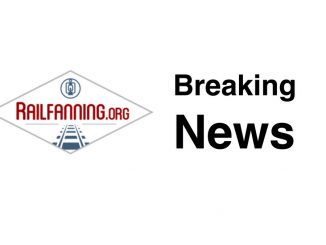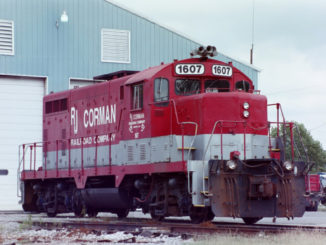ATLANTA — RMI, the market leader and largest independent provider of accurate, reliable, comprehensive, and secure rail information services to the transportation industry, has announced its 2009 Fast Track Award winners.
Now in its fourth year, the Fast Track Award program honors RMI customers who exemplify RMI’s goal to streamline processes and improve procedures in the rail industry. This year’s award recipients will be recognized in the 2009 Fast Track calendar.
The Fast Track award is designed to recognize RMI’s RailConnect and ShipperConnect “power users,” those organizations that maximize the value of RMI’s services by implementing procedures resulting in more comprehensive automation of manual processes, improved information capture and reporting, greater accounting control, enhanced asset management, or more efficient processes in any capacity.
The following is a summary of the 2009 Fast Track winners:
— Buckingham Branch Railroad (BB): The BB uses TMS blocking tables to automate constructive placement and to apply charges and RWCs on 95 percent of its inbound moves. 75 percent of outbound traffic is billed using EDI Bills of Lading.
— CG Railway (CGR): With the help of RMI, CGR set up AEI sites in TMS to automatically notify the railroad whenever its connecting carriers deliver traffic. These messages trigger scheduled jobs to handle the inbound traffic. This simple change has saved CGR over 400 man hours a year.
— CSXT: CSXT turned to RMI to help develop an automated system that tracks the movement of empty private cars and highlights those cars that do not meet the tariff requirement for moving free of charge. This automated report process generates an additional six million dollars in revenue annually for CSXT.
— Dakota, Minnesota & Eastern RR (DME) and Iowa, Chicago & Eastern Railroad (ICE): DME/ICE operations have been enhanced using ShipperConnect, AEI automation, and TMS work lists to standardize and streamline the customer request to service delivery cycle. As a result, the average daily inventory of 12,000 railcars is updated 25% automatically. Industry reportings within 4 hours include interchanges 90%, customer moves 88 percent, and train events 94 percent.
— Louisville & Indiana Railroad (LIRC): An aggressive rollout of ShipperConnect has allowed LIRC customers to release cars directly on the internet. As a result, the LIRC Railinc scorecard reported 98 percent of all movement events on time, and the road has more than halved its average reporting time to only one hour and three minutes.
— Montreal, Maine & Atlantic Railway (MMA): MMA began to send daily Online Inventory Management reports automatically to its customers. It implemented automatic constructive placement. These changes reduced the number of phone calls to the Customer Service Center for car tracing/location by 70 percent and the amount of demurrage disputes by over 50 percent. Automation using TMS blocking rules generated over 7,300 charges and increased the percentage of charges created automatically from 66 percent to 91 percent.
— Ontario Northland Railway (ONT): Since implementing RMI systems, including TMS and eBOL, ONT has seen the receipt of electronic bills of lading rise from 32 percent to approximately 80 percent of all originating forwarded traffic. This has resulted in a drastic reduction of costly mis-routes and lengthy delays at customs.
— Port Terminal Railroad Association (PTRA): Installation of GPS on all of its locomotives and integration of the captured data with TMS has greatly improved efficiency and productivity on the PTRA. With RMI’s GeoRailtrace and Geo-fencing, the PTRA can now automatically generate placement records within a minute of the physical placement of the cars at a customer’s facility. Geo-fencing reporting has improved PTRA’s auto-reporting by an additional 12 percent, to 94 percent, and has decreased disputes on the spotting of general service cars incurring demurrage.
— R.J. Corman: Using TMS auto-charge, R.J. Corman has eliminated the man hours necessary to keep track of charges in a spreadsheet and increased switching revenue by 53 percent. In addition, details can be condensed to a single report showing all charges. FMS enables R.J. Corman to monitor its railcar fleet more accurately. Greater control over cycle times and proper equipment utilization has resulted in a 55 percent increase in car hire revenue.
— Terminal Railroad of St. Louis (TRRA): RailConnect Business Intelligence helps TRRA manage their 1200+ daily interchanges. Using BI, the TRRA has improved dwell time by 17 percent. TRRA also implemented RMI’s Car Hire Payable Managed Services (CHMS), saving 15 percent in missing reclaims. CHMS has also decreased the amount of counter reclaims paid and taken against TRRA by 30 percent.
— Wisconsin Northern Railroad (WN): The advanced use of TMS has helped WN make significant progress towards automating routine tasks. The WN now routinely scores over 98% in overall TRAIN II events reported and timeliness, and it frequently scores 100 percent in several event categories. Car hire expense has been reduced an estimated 10 percent since WN began using Car Hire NextGen for analysis and TMS for application of demurrage tariff provisions.
— WT&L Corp.: Using FMS, WT&L has reduced erroneous data by 50-75%. The time spent correcting faulty data has been reduced by 90 percent. RMI’s e-BOL provides a single portal to enter and manage Bills of Lading for all of WT&L’s customers and carriers. This has resulted in a 75 percent time savings and greater quality control. Using RMI systems, WT&L collects close to 100 percent of all waybills requested.
Choices for the Fast-Track awards are based on several criteria, including use of advanced RailConnect features such as ShipperConnect, inbound blocking tables, SuperTrip and the RailConnect Query Tool. The program also requires consistently high percentage compliance with TRAIN II reporting standards.
— Business Wire




